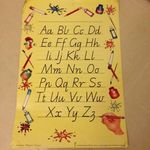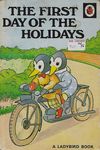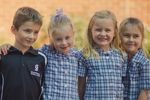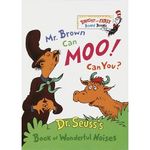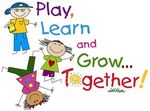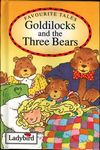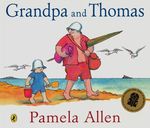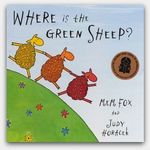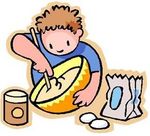Starting School Information Foundation 2020 - Mrs Cindi Bruechert, Principal Strathfieldsaye Primary School - Strathfieldsaye ...
←
→
Page content transcription
If your browser does not render page correctly, please read the page content below
Starting School
Information
Foundation 2020
For further information please contact
Mrs Cindi Bruechert, Principal
Strathfieldsaye Primary School.
Phone : 5439 5207 Fax : 5439 5476
email : strathfieldsaye.ps@edumail.vic.gov.auOur Core Values
At Strathfieldsaye Primary School we have a set of core values which underpin all the work,
relationships and directions of the school. They reflect the needs of our community and the
aspirations we have for our students through learning and their development as young
people.
Our CORE Values are :
Caring
We look after our environment and we show kindness to other people and to ourselves.
Optimism
We are grateful for what we have and believe that we can make good things happen.
We choose to be positive.
Respect
We have integrity and we understand that everyone has different feelings and different
approaches to life.
Excellence
We set high standards and we persist until we have done our best.
These core values were developed in consultation with students, the school community and
teachers to reflect the areas which we hold as being important and special to our school
community.
There are many other values which we celebrate within the school through wellbeing
programs such as Tribes, You Can Do It and Bounceback. However, these core values provide
a recurring theme throughout the child’s learning journey at Strathfieldsaye Primary School
as they grow as an individual and a citizen of our community.
Caring
Optimism
Respect
ExcellenceWelcome to
Strathfieldsaye Primary School
Strathfieldsaye Primary School operates within a caring environment, striving for excellence
and equity through the development of strong relationships between students, teachers and
parents.
As a school community we want to create a culture of continuous improvement and success
that leads our students to become active citizens who have a lifelong passion for learning. We
believe that this is best achieved when students are able to follow their passions and have an
education experience that is designed to meet their individual needs.
My focus as the Principal of Strathfieldsaye Primary School is to provide an outstanding
educational opportunity for all students in our school community that challenges and extends
each individual. This can only be achieved by developing strong, positive relationships that
enhance the social and emotional experiences of students and families at the school.
This booklet has been produced to inform you of how students learn at school and how you
are able to help your child. We hope that the information in this booklet will prove useful to
assist with your child's transition from Pre-school to Foundation and we encourage you to
contact the class teacher, Principal or Assistant Principal if you would like any further
assistance. Please remember:
Your child's most important learning has already commenced even before starting school
We recognise that parents/guardians are important educators of their children
Parents/guardians, students and teachers share a responsibility in each child's learning
We seek to share this responsibility collaboratively with parents/guardians and students
As we move through this next phase of our journey, I encourage you to contact the
Foundation staff or myself if you have any further concerns or queries. We aim to ensure that
your child will have a happy and successful education at our school.
Mrs Cindi Bruechert, Principal
Remember,
all children are different,
and learn at different rates
and in different ways.ENROLMENT REQUIREMENTS :
Parents/guardians enrolling a child in a Primary School are required to provide the following :
1. Fully completed school enrolment form
2. Copy of the child’s Birth Certificate
3. The child’s School Entry Immunisation Status Certificate
Every child requires this Immunisation Certificate, regardless of whether the child has been
immunised or not (see information letter in enrolment package).
PLEASE NOTE : Confirmation of your child’s enrolment cannot be made until all documents
have been received.
Transition Program—2.30 pm to 3.30 pm
As part of our classroom activity program from Pre-school to Foundation, Pre-school children
will be invited to spend two afternoons at the school in the Foundation classrooms. Children
will be allocated two sessions, i.e. two Monday afternoons or two Tuesday afternoons or two
Thursday afternoons (additional sessions can be arranged if they are required to assist your
child’s transition). This year our transition sessions will be held on:
Monday 21st & 28th October 2019
Tuesday 22nd & 29th October 2019
Thursday 24th October & 31st October 2019
The teacher and group your child is allocated for these visits is only for the purposes of our
transition programs. Class and teacher placement for 2020 will be notified in the last weeks of
the 2019 school year.
New Families—Basket Tea
Each year (usually in November or December), a family basket tea is held at school. This is a
casual evening, and not a late night, and is a great opportunity for new families to meet
children/parents/guardians of current Foundation, as well as Foundation teaching staff.
Orientation Day Program
Tuesday 10th December 2019— 9.30 am to 11.00 am
Children will be placed into groups and spend the morning in the Prep classrooms where they
will have an opportunity to experience school activities.
The Principal, Mrs Cindi Bruechert, the Foundation Coordinator, as well as representatives
from the Parent Club will provide information for parents/guardians, including details of
uniforms, school banking and other activities.
Children will also have the opportunity to have play-lunch with their Grade 6 buddy.
Please note : Families who have enrolled their child at the school will be notified by mail of
details of the Transition and Orientation Programs.Buddies
The Buddy System commences on Orientation Day when a next year’s Grade 6 student meets
the prospective Foundation student during their first play-lunch together. They eat together
and then the Buddy introduces the child to the playground, toilet facilities and buildings of
the school.
The system carries over into the following year and ensures that the new Foundation student
has a friend, as well as someone to look after them in the playground for the first week of
their school life.
The new Foundation student will also receive a letter from their Buddy during the holidays in
January. This renews the bond and encourages enthusiasm for school.
2020 Term 1 : To be confirmed either Wednesday 29th or Thursday 30th January
to Friday 27th March
Tuesday 28 January is Curriculum Day - Pupil-free Day
To assist Foundation students to adjust and cope with the new demands of longer school days
and activities, their hours of attendance have been modified for the start of the year. The mid
-week rest day assists in the transition from pre-school hours to school hours routine. This day
is also designated for individual literacy/numeracy testing and parent/guardian interviews.
This process assists in the identification of your child’s strengths and future learning needs.
Foundation students will NOT be required at school on the following Wednesdays : 5, 12, 19
& 26 February.
Things that your child should feel and know about being in Foundation Grade
1. Familiarity with their classroom, knowing where the toilet is and how to use it
2. Check that your child knows :
the general layout of the school
where their storage facilities and locker are
3. Lunch. Your child should know the difference between their playlunch, healthy food
snack and their lunch, and how to feed themselves, and be able to :
unwrap a food packet
open a lunch box
unscrew a drink container
drink from a tap / bubbler
peel a piece of fruit
4. Encourage your child to be independent in :
Please consider Velcro fastenings if
Dressing, especially buttons and shoe laces your child is unable to tie shoe laces
Toileting, eg. washing hands, flushing toilet
blowing their nose
Excursions : Foundation students participate in various excursions during the year. They are
an important part of the program, and these experiences form a basis for work done in the
classroom prior to, and following the excursion.Emotional Development
Children have to cope with their feelings in a variety of situations, both at home and school.
Unhappiness can often be avoided if parents/guardians prepare children emotionally for
school. This means giving children opportunities to experience such feelings as :-
A sense of security - the child should be confident that they are loved and that there is a
level of consistency in their home life
Separation from parents/guardians - the child should be confident that when parents/
guardians leave them they will be back when they say they will
Self control - appropriate ways to express feelings of fear, frustration or anger, other than
tantrums, should be developed
Confidence - the child should be encouraged to try new tasks and have their attempts
rewarded
Responsibility - the child should start to care for their own things and also respect other
people's property
Persistence - most new tasks need to be practised often before success is achieved
Individual needs—building a belief that their needs will be taken seriously and resolved
positively
Social Development
Small children can benefit from the opportunity to mix with other children and adults apart
from their parents/guardians.
They will learn skills which will help them to cope with the social aspects of school.
For example
listening to others
doing what is asked
making needs and requests known
sharing with others
taking turns
cooperating
following instructions
Physical Development
Children grow at different rates at different times in their lives. Schools expect and cater for a
wide-range of skills and abilities in children in their Foundation year.
If a student has an illness or condition (eg asthma, an allergy or epilepsy), the teacher should
be told about it.
If a parent/guardian has any doubts about a child's eyesight or hearing, advice should be
sought from Maternal & Child Health Centres (Infant Welfare Centres), or from a Doctor or
Optometrist before starting school.
Starting school is usually a tiring experience, even for healthy children.
Good food and plenty of sleep is recommended for Foundation students.Management of Student Behaviour Our behaviour management program is based on a set of rights and responsibilities. It is aimed at being a positive model that reinforces good behaviour, with consequences for behaviour that is not acceptable. We are committed to providing a safe, harmonious school environment where physical, verbal and social abuse is not tolerated. Students have a right to be safe, to learn, to be treated with respect and to have their property treated with respect. Students also have a responsibility to ensure that they do not infringe on the rights of others. Teachers are available to assist students if they experience difficulties, and it is our expectation that students will seek a teacher's assistance, rather than take action on their own behalf or on behalf of others. This may be slightly different to the advice some parents/guardians give children to defend themselves or fight back. However in order to protect all students, we encourage you to reinforce the expectation to seek a teacher to help resolve any issues or disputes. Literacy Program There is a daily two hour literacy program taken in the Foundation to Grade 6 areas at Strathfieldsaye Primary School. Guided Reading is one component of the program. It is a carefully balanced and structured approach for the teaching of reading. It emphasises learning to read for meaning. Students are matched to text and their progress is continually monitored and assessed. The teachers encourage students to talk, read and think their way through a text while assisting them to develop appropriate reading strategies. Writing is taught during the literacy block. Students are encouraged to become enthusiastic writers, developing knowledge and gaining control of all aspects of the writing process. The students learn to compose, record, revise and publish their writing. Students try spelling unknown words. They should learn to spell words they supply themselves in the course of their own expression. Students learn a bank of common words that they can recognise quickly. Speaking and listening skills are also developed during these sessions.
Writing Just as children learn to ‘talk before talking’, so children learn to ‘write before writing’. This means that developing writers go through recognised stages of learning how to write. These are similar to how they learn to talk. These stages are: 1. The Scribble Phase Here the child has reasoned that messages are presented to other people by putting squiggly lines on paper. The starting point may be anywhere on the page. Later the scribble will develop a left to right direction. 2. Personal or Non-conventional Symbols This stage includes left to right direction and separate symbols. The child can read back the writing if asked what they have written. 3. Strings of Conventional Letters The child strings together many letters from the alphabet in left to right direction. The symbols are repeated. 4. Group of Letters with Spaces Between Usually there is no match between the letters used and sounds of the words, the child has some developed ideas (or concepts) of a ‘word’.
5. Writing with a Developing Awareness of Sound-Symbol Correspondence
Often there is a mixture of upper and lower case. The reader is able to interpret the message. As the
child progresses through these stages, the teacher takes the opportunity to write the conventional
form of the child's messages in a correct model.
Preserve your
child's Foundation
work by laminating
drawings for
posters or creative
wallpaper and
binding writings and
drawings into a big
book.
Handwriting
This style of handwriting is called
Victorian Modern Cursive.
Victorian Modern Cursive resulted from
research into handwriting.
It was felt that the earlier general
handwriting patterns are established
and practised, the more likely it is that
these will become automatic.
Children need to be taught this clearly
defined handwriting as early as possible
in line with developing fine motor skills.Suggestions For Parents/Guardians
To assist in the development of fine motor skills, allow and encourage your child to work
with scissors for cutting and use crayons, pencils, textas for drawing and writing etc. Also
make available jigsaws, lego, mobilo and construction equipment to promote these skills.
Encourage the use of lower case letters as the children will become familiar with these
during their Foundation year
Make sure and encourage your child to hold a pencil
correctly as poor pencil grip slows their writing and
performance down
Show children how to write their own names and
other words of interest
Make your own ‘Big Books’. Re-write known and
favourite stories, using the handwriting style to make
the reading material
Occasionally look at certain letters from children’s
writing
SPELLING
Spelling is one of the skills involved in Writing and developed within the two hour Literacy
program.
What We Know About Spelling
1. Spelling needs to be related to writing
2. Every writing time is a SPELLING TIME
3. Heavy stress on spelling mistakes in the infant grades can easily cause students to lose
confidence
4. Praise and encouragement of all attempts are important “Look, you got that word nearly
right”
5. Identify the correct letters in a word rather than stressing incorrect letters, eg ‘ ‘wos’ is
a great attempt for was!! (But what else could make the sound ‘o’ as in was? Discuss the
vowels and together work out the correct one, eg ‘a’, then demonstrate correct spelling)
Sometimes words (especially more frequently used words) can be best spelt by focusing
on the visual pattern, rather than the sounds.What Parents/Guardians Can Do
show that you care about spelling. Within the family, frequently ask
"Who knows how to have a go at this word?”
encourage personal word lists - Words I have learned to spell.
find and play spelling and language games that you enjoy.
eg - I spy……
- Rhyming Words
- Hangman
read lots of nursery rhymes and nonsense rhymes
sing with your children.
Reading
Read stories to your children every day. Make it an enjoyable time - a regular set part of
routine, eg after a bath, or when children are in bed.
Through stories, you share your pleasure in books and help your children get to know the
language used in them.
As you read, hold the book so the children can see it too.
Encourage children to join in (the parts that they know by heart), thus building confidence in
their abilities as readers.
Suitable stories for young children with lots of repetition are:
* Little Red Riding Hood * The Ladybird books
* The Three Little Pigs * Mem Fox books
* The Dr. Seuss books * Bill Peet books
* Pamela Allen books * Hazel Edwards books
Most Important :
Sometimes tell children
the stories you know,
eg. Goldilocks.
What Parents/Guardians Can Do
Encourage and praise children's reading
Let books and reading be an important part of the family life
Use local resources such as libraries
Involve children in day to day reading activities in the home (look at the labels on milk,
bread etc)
Keep in contact with the school - don't hesitate to ask questions
Encourage children to follow up their own reading interestsSharing Books at Home (Please pin onto fridge)
Who can your children read to?
Mum, Dad, Gran, Sister, Brother (Anybody)
When can they read to you?
When it's QUIET
When you both feel like it
Where can they read?
Somewhere comfortable, cosy
How can they read?
With praising, (‘Terrific’, ‘Great’)
Pausing (time to answer)
Prompting
What can they read?
Books, newspapers, library books, recipes, signs, letters,
shopping and everyday lists, etc.
Questions to ask?
"What book have you borrowed this week?"
"Is it interesting?"
"Tell me all about your book"
Suggestions -
Ask "Why don't you borrow a book about space OR
animals OR Japan OR .. something you are interested in?"Mathematics The major areas covered in primary school are Number and Measurement. Number In Foundation, students connect number names and numerals with sets of up to 20 elements, estimate the size of these sets, and use counting strategies to solve problems that involve comparing, combining and separating these sets. They match individual objects with counting sequences up to and back from 20. Students order the first 10 elements of a set. Measurement Through use of every day materials, students learn techniques for measuring length, time, capacity, mass, weight, area, temperature and volume. These areas are often covered in Activity Maths sessions. They also learn Spatial Relations, and in this study students learn about common shapes. This involves them in drawing, cutting out, folding, colouring and handling a range of materials. Chance and Data Chance relates to the concept of randomness and the use of probability as a measure of how likely it is that a particular event will occur. The idea of chance and how this affects our decisions is informally introduced by discussing different events and situations in the classroom. Data deals with collecting, organising, summarising and presenting data, for example, simple graphing activities. Students are involved at school in various programs to develop mathematical skills. Some of the many programs are : Hands-on Maths Effective learning takes place when students are involved in what they are doing. Teachers organise various mathematical activities so that the students develop an understanding of all mathematical concepts, through a ‘hands-on’ approach. The students are encouraged to work cooperatively and use a problem-solving approach. Activity maths gives students the opportunity to interact and talk about what they are doing. It also provides a forum to challenge and extend their mathematical thinking. Storybook maths Books extend and develop students ideas of the world. Stories and illustrations often carry mathematical ideas and present opportunities to involve students in problem-solving, pattern and order activities, classification and other mathematical skills. Books that are ideal are : Who Sank the Boat?, Goldilocks and the Three Bears, Mr. Archimedes’ Bath, Sizes, Ten Apples Up On Top, A Big Ball of String etc.
WHAT PARENTS/GUARDIANS CAN DO
Encourage children to make use of everyday family activities, such as cooking, shopping and playing
games which involve keeping scores, calculating journey times, discussing left-hand and right-
handedness, and so on. It should only take a few minutes.
Words that can be used :
under/over
big/small
heavy/heaviest
long/short
left/right
wide/narrow
above/below
between/behind/in front
Counting :
knives and forks when setting the table
pieces of cake
pegs
people
bread tags
lollies
plastic milk bottle tops
corks
Shopping :
Change from shopping
Familiarity with money
Measuring :
Which jar holds the most?
How can you tell?
Who’s the tallest?
How many footsteps to the letterbox?
Toys can help your child with maths : eg How many marbles fill the bag?
Will 6 cars fit in?
Make available :
Pens, pencils, paper, puzzle books, jigsaws, construction materials, boxes, icy pole sticks
Try to :
Praise
Encourage
Talk about
Be patient
Listen
Ask questions
Engender a love of maths : Remember maths is fun!PLAYDOUGH RECIPES
1 cup plain flour
1/2 tablespoon cooking oil
1/2 cup salt
food colouring
1 tablespoon cream of tartar
1 cup of water (add gradually -
you may not need to use this much)
Mix all ingredients in a saucepan and stir over
medium heat until a stiff,
workable consistency is reached
(3 to 5 minutes).
WASH SAUCEPAN IMMEDIATELY.
Store in a sturdy airtight plastic container.
Playdough
(1200 watt Microwave)
Ingredients :
1 cup SR flour
1 cup water
1/2 cup cooking salt
1 tablespoon vegetable oil
2 tablespoons Cream of Tartar
Food colouring
Method :
Heat cooking salt in water in a glass bowl in microwave for 1 minute,
add food colouring; allow to cool.
Stir in flour, cream of tartar and oil. Stir well with wooden spoon, cover bowl
with gladwrap and microwave for 1 & 1/2 minutes on high.
Remove and stir with wooden spoon until well combined and thick.
Cool slightly and store in zip-lock bags.Strathfieldsaye Primary School
Foundation (Preps) celebrate 100 days
Welcome to our school community.
We look forward to working with you to
share and enjoy rich, rewarding educational
experiences for your child’s primary education
at Strathfieldsaye Primary School.You can also read

